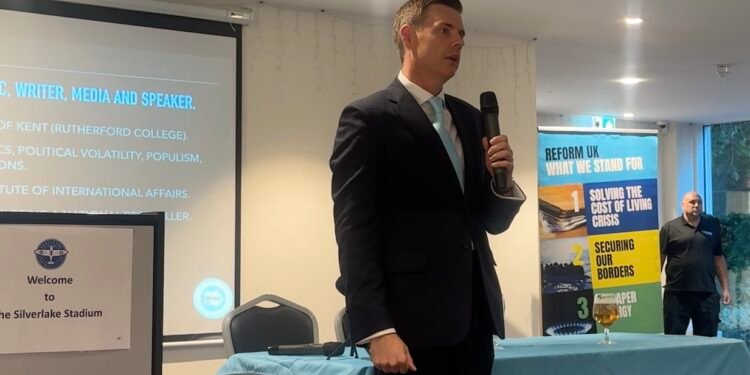More than 200 members of the Reform Party gathered at Eastleigh Football Stadium last night to hear historian David Starkey MBE, GB News presenter Matt Goodwin and economist Mark Littlewood call for a dramatic shift in Britain’s political direction.
The event, billed as “Battle for Britain,” saw each speaker take aim at the main political parties, with Goodwin delivering a rousing critique of Westminster’s approach to immigration, national identity, and public spending.
“Good evening, everybody. It’s great to be with you,” Goodwin began, immediately capturing the crowd’s energy. “My name’s Matt Goodwin. I want my country back. Yes. That’s why we’re here.” He went on to accuse mainstream politicians of imposing “mass uncontrolled immigration” without the consent of the public and lambasted Prime Minister Keir Starmer’s government for “idiotic decisions” on borders and public policy.
Goodwin highlighted what he called “managed decline” in Britain. “People want British people to be put first. They want the law-abiding, hard-working majority to be put first and they don’t want to live in all of the managed decline and the endless chaos and carnage we see around us today.” He argued that Reform is now “winning the intellectual argument” on issues ranging from immigration to the economy.
He mocked Starmer’s popularity, comparing it to “Meghan Markle” and “not far off Prince Andrew” in the polls, and accused Labour of rewarding ministers despite failures on border control and asylum. Goodwin called for repealing the Human Rights Act and leaving the European Convention on Human Rights, arguing it would save taxpayers billions to be spent on the NHS and public services.
Historian David Starkey delivered a stern warning about the direction of Britain, accusing the political elite of abandoning national traditions in favour of what he called “abstract international liberalism.” Citing Benjamin Disraeli’s famous 1872 speeches—delivered “with two bottles of brandy, none of this nonsense of abstemiousness”—Starkey argued that change is inevitable in a progressive country, but only change rooted in national tradition should be welcomed.
“We’ve been completely seduced by this idea of international liberalism,” Starkey said. He blamed a post-war consensus, notably shaped by Churchill, for prioritising global frameworks and minority rights above the interests of the British nation and its people. “We’ve got, above all, centrally what seems to me to be the theme that any proper right-wing government coming in has got to have: the centrality of the nation and the inhabitants of the nation. Until that is understood, we will get nowhere.”
Starkey condemned the current British elite for what he described as a misplaced sense of duty to “world welfare” rather than British welfare. He cited former Treasury officials and the legal system as prime examples, calling out the influence of human rights law, which, he said, has become “anti-democratic” and “counter-majoritarian,” favouring minorities over the majority and creating “an extraordinary mess.”
He pointed to the Chagos Islands as a “ludicrous example” of Britain’s legal entanglements and warned that America narrowly avoided a similar fate. “If Kamala Harris had won, that’s exactly what would have happened to America,” Starkey claimed.
Referencing US Senator JD Vance’s controversial speech in Munich—which Starkey said reduced the German chairman to “blubbering tears”—he noted Vance’s core argument: a fundamental difference in the meaning of democracy. “In continental Europe, democracy means protecting minority rights and limiting the majority by law, because of the fear of a repetition of Nazi Germany. In America, it still just means rule by the majority. And we, ladies and gentlemen, are perilously on the point of falling into the European camp—which is, of course, exactly what Blair and Brown and Starmer want.”
To those who accuse him of ‘treason’ for looking to America for inspiration or support, Starkey was unapologetic. “Every single major revolutionary change in Britain involved foreign help, if not foreign leadership. 1689, it was the Dutch. The Tudors, it was the French. Magna Carta, it was the French again. If the Americans, if the new world, redresses the balance of the old—ladies and gentlemen, I don’t care.”
Starkey’s message was clear: unless Britain reasserts the primacy of its own nationhood and traditions, it risks decline, legal paralysis, and a loss of independence—while the hope of rescue from abroad grows ever fainter.
Mark Littlewood, the former Director General of the Institute of Economic Affairs, delivered a forensic critique of government spending and economic mismanagement, drawing parallels with past periods of political upheaval.
The event was punctuated by calls for unity and organisation, with Goodwin urging Reform members to “start getting serious people around the room to start planning for what this government is going to do.” He described the current moment as the epicentre of a “political revolution that is going to fundamentally change the direction of this country,” predicting Reform would sweep through Labour’s heartlands and reshape the political map.
There was a palpable sense of optimism in the room. “Everyone in this room…is at the epicentre of a political revolution,” Goodwin said. “The British people clearly have had enough.”
As the evening ended, the growing movement of Reform UK seemed even more galvanised, fuelled by frustration with the status quo and hopes for radical change. Whether Reform’s surge in the polls translates into seats and sustained momentum remains to be seen, but last night in Eastleigh, the mood was one of confidence, defiance and optimism.
The evening was put together by Reform UK Organisers John Edwards, Alex Culley and Sam Wright who all also gave speeches which are available on the Southampton Times YouTube Channel.
Watch the full speeches below:
































